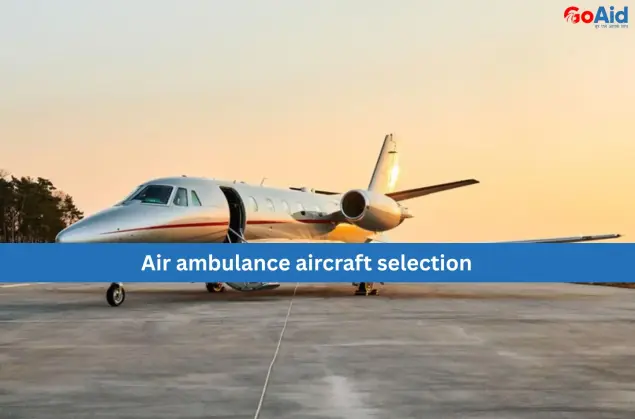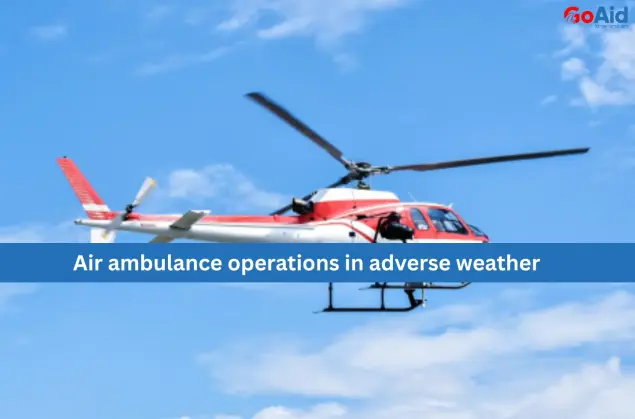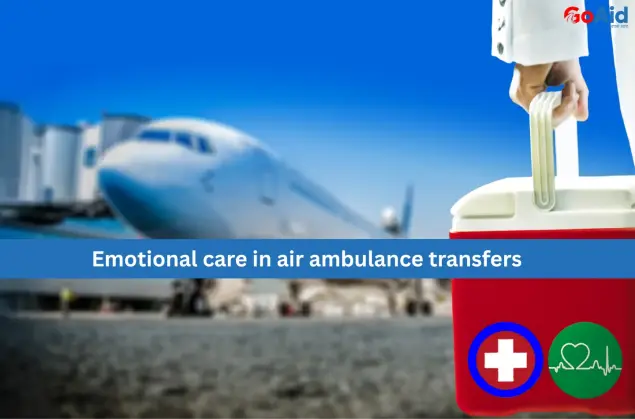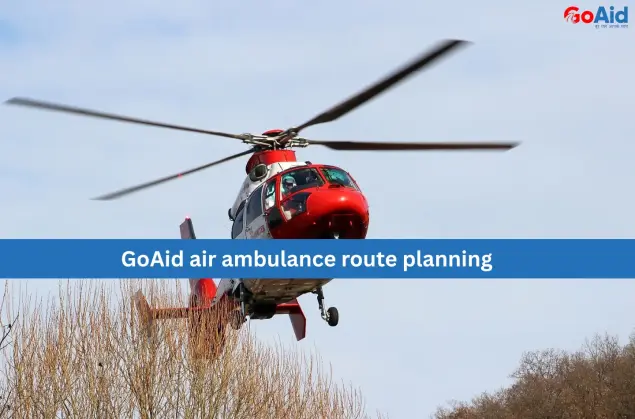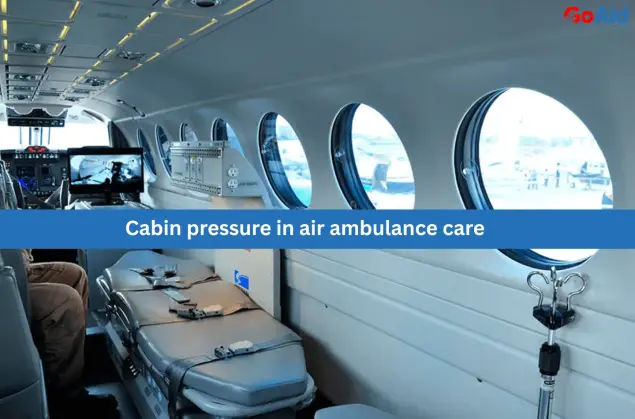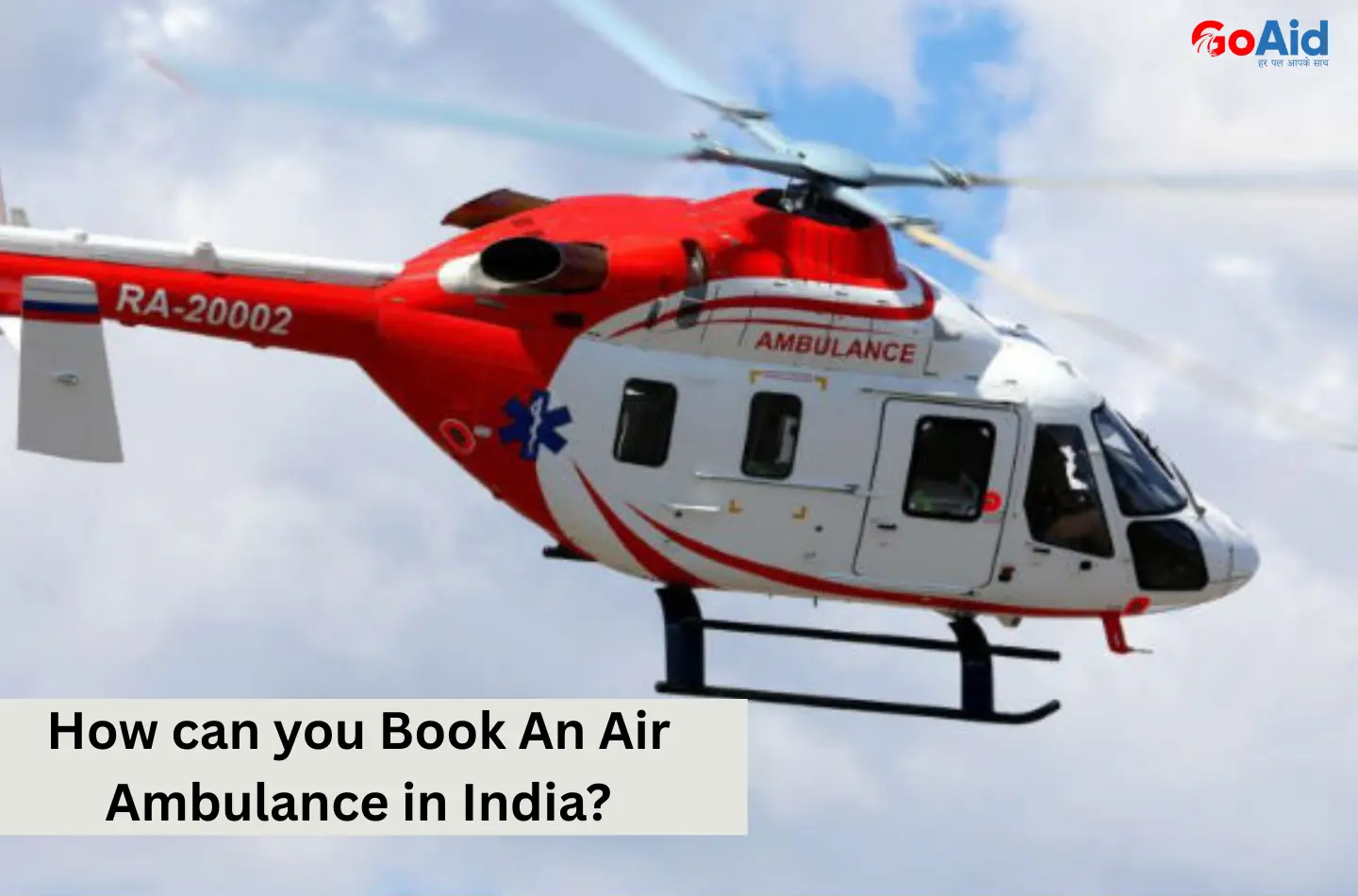
How can you Book An Air Ambulance in India?
Booking an air ambulance in India requires careful planning and quick action during emergencies. GoAid Ambulance Service offers multiple convenient options to book an ICU-equipped air ambulance with trained paramedics.
You can call their 24/7 helpline at 8008280020 for immediate assistance. This provides details about the patient’s condition, location, and hospital destination.
Alternatively, the GoAid App allows instant booking with real-time tracking and automated coordination with nearby aircraft. Verified providers like GoAid ensure proper documentation, government-approved rates, and safe, medically supervised transfers.
Whether for trauma, critical illness, or post-surgery transfers, understanding the booking process and choosing a trusted provider ensures timely, reliable, and life-saving air ambulance services anywhere in India.
Top 10 Do’s and Don’ts while Booking an Air Ambulance in India
Booking an air ambulance requires precision, awareness, and quick decision-making to ensure patient safety. Following proper do’s and avoiding common mistakes can save precious time, prevent complications, and ensure a smooth, medically supervised transfer with ICU support, ventilators, and trained paramedics across India.
Top 10 Do’s while Booking an Air Ambulance in India
Knowing the right steps while booking an air ambulance ensures safe, fast, and reliable transfers. GoAid highlights essential do’s to follow for seamless medical transport in emergencies.
1. Do Verify the Ambulance Provider
- About: Always confirm that the air ambulance is operated by a verified, licensed provider like GoAid. Check credentials, government approvals, and past patient reviews for credibility and safety assurance.
- What Will Happen if You Don’t Do This? Using unverified providers can result in delayed transfers, poor medical support, lack of ICU facilities, or even safety hazards during patient transport.
2. Do Provide Accurate Patient Details
- About: Share complete information about the patient’s condition, medical history, and urgency to help paramedics prepare for necessary interventions and equipment during transfer.
- What Will Happen if You Don’t Do This? Incomplete or inaccurate details may lead to delays, improper care, or the wrong medical setup being arranged, risking patient safety.
3. Do Confirm ICU and Life-Support Facilities
- About: Ensure the air ambulance has ICU equipment, ventilators, monitors, and trauma kits for continuous care during the journey. This is critical for critical or trauma patients.
- What Will Happen if You Don’t Do This? Lack of proper ICU facilities can worsen the patient’s condition mid-transfer, increasing risk of complications or emergencies.
4. Do Check Trained Paramedics Availability
- About: Verify that experienced paramedics and medical staff accompany the patient to manage emergencies and provide continuous monitoring during air transport.
- What Will Happen if You Don’t Do This? Without trained staff, critical interventions may be delayed or missed, compromising patient safety and treatment outcomes.
5. Do Keep Emergency Contacts Ready
- About: Maintain contact numbers of hospitals, doctors, and family members to facilitate coordination and faster decision-making during the transfer.
- What Will Happen if You Don’t Do This? Delays in communication can cause confusion, slow down hospital preparedness, and risk patient health during emergencies.
6. Do Ensure Proper Documentation
- About: Keep ID proofs, medical reports, insurance papers, and consent forms ready for hassle-free hospital admission and regulatory compliance.
- What Will Happen if You Don’t Do This? Missing documents can delay hospital entry, create legal complications, and waste crucial minutes during emergencies.
7. Do Clarify Costs and Insurance Coverage
- About: Discuss charges, insurance acceptance, and payment options to avoid financial confusion during urgent transfers. GoAid offers government-approved rates and insurance assistance.
- What Will Happen if You Don’t Do This? Surprising costs or insurance rejections may delay the transfer or create unnecessary stress for families.
8. Do Track the Ambulance in Real-Time
- About: Use apps or helpline tracking to monitor the air ambulance’s location, estimated arrival, and patient status for better coordination and reassurance.
- What Will Happen if You Don’t Do This? Lack of tracking may cause uncertainty, miscommunication, or missed instructions during critical emergency management.
9. Do Prepare the Patient for Transfer
- About: Ensure the patient is stabilized, secured, and ready for air transport, following paramedic guidance to prevent injuries during movement.
- What Will Happen if You Don’t Do This? Improper preparation can worsen injuries, cause discomfort, or create complications during the flight.
10. Do Choose a Reputable Provider for Long-Distance or International Transfers
- About: For interstate or international air transfers, select an experienced provider like GoAid that can manage permits, customs, and medical requirements efficiently.
- What Will Happen if You Don’t Do This? Unreliable providers may fail to manage documentation, flight coordination, or medical care properly, endangering patient safety and transfer success.
Know More: Air Ambulance Myths
Top 10 Don’ts while Booking an Air Ambulance in India
Avoiding common mistakes while booking an air ambulance is critical. Following these don’ts ensures patient safety, timely transfers, and smooth coordination during emergencies with GoAid’s professional and ICU-equipped services.
1. Don’t Choose an Unverified Provider
- About: Never book an air ambulance from an unlicensed or unknown provider. Lack of credentials may mean inadequate equipment, inexperienced staff, or safety risks during the transfer.
- What Will Happen If I Do This? Using an unverified provider can cause delayed transfers, substandard care, safety hazards, or even denial of service during critical emergencies.
2. Don’t Provide Incomplete Patient Information
- About: Avoid giving vague or partial details about the patient’s condition, medical history, or destination hospital. Accurate information ensures proper preparation for safe transfer.
- What Will Happen If I Do This? Incomplete details may result in wrong medical setup, delayed interventions, or improper equipment, putting the patient at risk.
3. Don’t Ignore ICU and Life-Support Checks
- About: Never assume the ambulance has all required ICU equipment. Confirm ventilators, monitors, and emergency kits before booking to ensure continuous care.
- What Will Happen If I Do This? Patients may face medical emergencies mid-flight without necessary life-support systems, worsening critical conditions.
4. Don’t Overlook Trained Paramedics
- About: Booking an ambulance without experienced paramedics can compromise patient safety. Skilled staff is essential for on-board monitoring and emergency interventions.
- What Will Happen If I Do This? Lack of trained paramedics can delay treatment, increase complications, and endanger the patient’s life during transfer.
5. Don’t Delay Booking in Emergencies
- About: Waiting or hesitating to book an ambulance can waste crucial time. Immediate action ensures rapid stabilization and transfer.
- What Will Happen If I Do This? Delayed booking may worsen injuries, increase risks of complications, and reduce chances of survival.
6. Don’t Ignore Cost and Insurance Clarifications
- About: Avoid booking without confirming rates or insurance coverage. Unexpected costs or rejections can create stress during emergencies.
- What Will Happen If I Do This? Financial surprises may delay transfer, cause disputes, or prevent timely patient care.
7. Don’t Forget Emergency Contacts
- About: Failing to provide hospital, doctor, or family contact numbers can hinder coordination during the transfer process.
- What Will Happen If I Do This? Miscommunication or delays in hospital preparation may compromise patient safety and treatment efficiency.
8. Don’t Neglect Real-Time Tracking
- About: Avoid booking without tracking options for monitoring ambulance location and estimated arrival, which helps families stay informed.
- What Will Happen If I Do This? Uncertainty can cause confusion, delay coordination, and reduce confidence in the emergency response.
9. Don’t Move the Patient Without Guidance
- About: Avoid relocating the patient without paramedic instructions, especially in trauma cases, as this may worsen injuries.
- What Will Happen If I Do This? Improper handling can aggravate fractures, head injuries, or spinal damage during transfer.
10. Don’t Choose Inexperienced Providers for Long-Distance Transfers
- About: Avoid booking long-distance or international transfers with providers lacking experience in permits, documentation, or cross-border coordination.
- What Will Happen If I Do This? Delays, denied flights, or inadequate medical support can endanger the patient and compromise transfer success.
Also Read: What are Trauma Emergencies? Explanation with Example
Top Features to Look in an Air Ambulance in India
Choosing the right air ambulance ensures safe, fast, and reliable patient transfer. Look for these top features to guarantee ICU-level care, trained staff, and advanced medical support during emergencies.
- ICU-Equipped Aircraft
Ambulances should have ventilators, monitors, and life-support systems to provide continuous critical care during transfers.
- Experienced Paramedics
Trained medical staff onboard can handle emergencies, administer medications, and stabilize patients in-flight.
- Fast Response Time
Quick deployment minimizes delays. This ensures patients reach hospitals rapidly, which is crucial for trauma and critical cases.
- Government-Approved Rates
Verified pricing and insurance support prevent financial surprises and make services accessible to all.
- Multiple Booking Options
Call, app, or online booking allows instant dispatch in emergencies without unnecessary delays.
- Real-Time Tracking
Families can monitor the ambulance location and estimated arrival, improving coordination and peace of mind.
- Specialized Equipment
Trauma kits, infusion pumps, defibrillators, and oxygen supply enhance patient safety during long transfers.
- Domestic and International Coverage
Ability to manage interstate and cross-border transfers with proper coordination and permits.
- Safety Protocols
Advanced aircraft maintenance, secure patient handling, and strict hygiene ensure safe and reliable travel.
- Patient Comfort and Support
Proper seating, immobilization, and paramedic reassurance reduce stress and improve in-flight care.
How to Book the Best Air Ambulance in India
Booking the best air ambulance requires careful selection of a verified, experienced provider. Start by assessing ICU and life-support facilities, availability of ventilators, trauma kits, and trained paramedics.
Confirm government-approved rates, insurance coverage, and emergency response time. Use instant booking options like the GoAid App or a 24/7 helpline (8008280020) to request the ambulance. Provide accurate patient details and hospital destination to ensure proper preparation.
Choose a provider with national and international coverage, real-time tracking, and excellent safety standards. This approach guarantees fast, reliable, and professional air ambulance transfers for trauma, critical illness, or post-surgery patients across India.
Best Air Ambulance Service Provider in India
GoAid Ambulance Service stands out as the leading air ambulance provider in India. With ICU-equipped aircraft, ventilators, and advanced life-support systems, GoAid ensures safe and reliable patient transfers.
Their trained paramedics handle emergencies with expertise. This provides continuous care during domestic and international flights. GoAid offers multiple booking options via app or 24/7 helpline, government-approved affordable rates, and real-time tracking for families.
The service caters to trauma, accident, post-surgery, and critical care patients, prioritizing fast response and patient stabilization. With nationwide coverage and a commitment to safety, GoAid is recognized as the most trusted and professional air ambulance provider in India.
Conclusion
In conclusion, we have provided all the details about Do’s and Don’ts While Booking an Air Ambulance in India. By understanding proper procedures, essential features, and trusted providers like GoAid, families can ensure safe, fast, and medically supervised transfers.
Following these tips reduces risks, prevents delays, and guarantees ICU-level care, ventilator support, and expert paramedics during emergencies.
Making informed decisions allows patients to reach specialized hospitals quickly, improving survival and recovery outcomes. GoAid’s professional services offer peace of mind and reliable patient care across India and abroad.
FAQs
Q1: How quickly can I book a GoAid Air Ambulance?
A: You can book instantly via the GoAid App or 24/7 helpline (8008280020). Rapid dispatch ensures the ambulance reaches the patient in a minimal time.
Q2: What facilities are available in GoAid air ambulances?
A: GoAid ambulances are ICU-equipped with ventilators, monitors, trauma kits, infusion pumps, and life-support systems for critical patient care during transfer.
Q3: Are GoAid Air Ambulances safe for children and elderly patients?
A: Yes, GoAid caters to all ages. This provides specialized care, pediatric and geriatric support, and trained paramedics for safe transfers.
Q4: Does GoAid accept insurance for air ambulance transfers?
A: Yes, most health insurance policies are accepted, and GoAid assists with pre-approval, claims, and transparent billing.
Q5: Can GoAid handle long-distance or international transfers?
A: Yes, GoAid provides domestic and international transfers, coordinating with hospitals, authorities, and medical escorts for continuous ICU care.
Q6: How do I know if GoAid is a verified provider?
A: GoAid is government-approved, licensed, and recognized nationally for professional air ambulance services. This ensures safe, reliable, and credible patient transfers.
Q7: What is the average response time for GoAid Air Ambulances?
A: GoAid ensures a 10-minute response time in most cities, dispatching ICU-equipped aircraft and trained paramedics promptly.
Q8: Are there specialized features for trauma patients?
A: Yes, GoAid ambulances have trauma kits, immobilization devices, defibrillators, and continuous monitoring for critical trauma care.
Q9: Can I track the ambulance during transfer?
A: Yes, GoAid provides real-time tracking via app or helpline, allowing families to monitor location, estimated arrival, and patient status.
Q10: How do I choose the best air ambulance for emergencies?
A: Select a verified provider like GoAid, check ICU and life-support facilities, trained paramedics, government-approved rates, and nationwide or international coverage for safe transfers.
